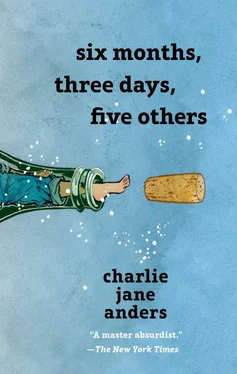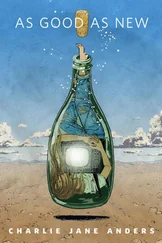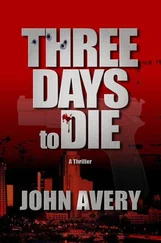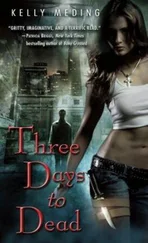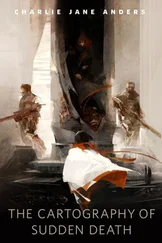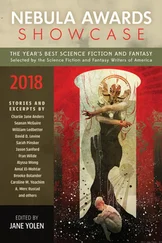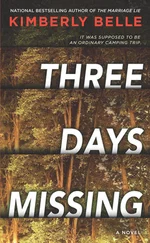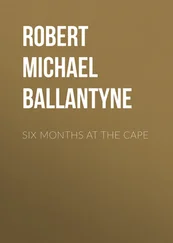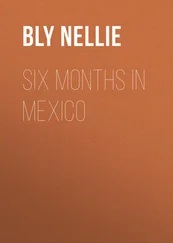Чарли Андерс - Six Months, Three Days, Five Others
Здесь есть возможность читать онлайн «Чарли Андерс - Six Months, Three Days, Five Others» весь текст электронной книги совершенно бесплатно (целиком полную версию без сокращений). В некоторых случаях можно слушать аудио, скачать через торрент в формате fb2 и присутствует краткое содержание. Город: New York, Год выпуска: 2017, ISBN: 2017, Издательство: Tom Doherty Associates, Жанр: Фэнтези, Фантастика и фэнтези, nsf, на английском языке. Описание произведения, (предисловие) а так же отзывы посетителей доступны на портале библиотеки ЛибКат.
- Название:Six Months, Three Days, Five Others
- Автор:
- Издательство:Tom Doherty Associates
- Жанр:
- Год:2017
- Город:New York
- ISBN:978-0-7653-9489-7
- Рейтинг книги:3 / 5. Голосов: 1
-
Избранное:Добавить в избранное
- Отзывы:
-
Ваша оценка:
- 60
- 1
- 2
- 3
- 4
- 5
Six Months, Three Days, Five Others: краткое содержание, описание и аннотация
Предлагаем к чтению аннотацию, описание, краткое содержание или предисловие (зависит от того, что написал сам автор книги «Six Months, Three Days, Five Others»). Если вы не нашли необходимую информацию о книге — напишите в комментариях, мы постараемся отыскать её.
Six Months, Three Days, Five Others — читать онлайн бесплатно полную книгу (весь текст) целиком
Ниже представлен текст книги, разбитый по страницам. Система сохранения места последней прочитанной страницы, позволяет с удобством читать онлайн бесплатно книгу «Six Months, Three Days, Five Others», без необходимости каждый раз заново искать на чём Вы остановились. Поставьте закладку, и сможете в любой момент перейти на страницу, на которой закончили чтение.
Интервал:
Закладка:
And then the ground levels out, the buildings grow denser, and the stench clouds Luc’s eyes just as the sights become unbearable. The crumbling shacks, made of a mixture of prefab construction materials from the ship, plus spongy wood, weak drywall and local rocks. The river clogged with effluent, running through the middle of Hopetown. The lashed-together pieces of failing technology. And above it all, the rank odor of wounds and sores that won’t heal properly due to the malnutrition. Luc saw a lot of nightmares, when he was helping to turn Benin into the world’s last breadbasket and visiting the Arkansas refugee camps. But here, no relief workers are coming. He passes a group of teenagers playing listlessly in the street, with arms like twigs and swollen torsos. Older people slump against the unstable walls.
But there’s something else, too—some of the people standing around that ugly modern-art sculpture made of cannibalized spaceship parts at the center of it all have a vacant look in their bloodshot eyes that he knows at a glance. And festering trackmarks on their arms. Luc files that away, for now.
The Survival Module—all that’s left of the Endeavour—is at the other end of Hopetown from where Luc and Sandy came in, along the filthy river and to the right. The dinged-up white structure, the size of the Opera House back home, has been dressed up as a town hall, with a podium and sound system out front, plus someone has painted a decorative gold leaf motif around the entrance using some local plant sludge. Sasha waves hi at the people sitting at desks inside the building, then runs off to tell her mother her amazing news.
“Oh, my lord,” says a middle-aged lady, maybe around fifty, sitting in a repurposed cockpit chair at the rear of the Survival Module, behind a big desk covered with data tablets. “Sasha actually did it. Mr. Deveaux, you don’t know any of us, but you’re famous around these parts: the agriculture expert who didn’t wake up.”
“Tell me what went wrong,” Luc says.
Here’s the secret that almost nobody ever guessed about Palm Strike: he was a brawler. The name “Palm Strike” was an intentional misdirect, to make people believe he was some kind of martial-arts wizard and then catch them off guard with his total lack of skill. People tended to overestimate him, and then underestimate him. He’d had months, not years, of training, but he mostly relied on the healing mojo and the enhanced strength. His detective skills, too, mostly involved punching people and asking questions.
So Luc sits there, for hours, and listens to the colony’s leaders talk about their incredibly meticulous terraforming process and all the things they did before and after planetfall to prepare the soil for farming. The tests that revealed nothing wrong, and the excellent early harvests. Inside, he’s still raging and traumatized by his endless cryo-nightmares, but he maintains a totally blank expression. Luc has to believe that whoever sabotaged his cryo-unit also made the voyage here—maybe even Dark Shard himself—and at some point Luc will have someone to hit. And that person will already know that Luc is Palm Strike, and will therefore fear him. He studies each of these people, looking for the signs of that fear. He’s a lousy detective, but he knows all about fear.
“We brought bioengineered microbes from Earth that were supposed to neutralize any toxins in the soil and correct the pH balance,” one burly man named Ron McGregor is saying, “but most of them died in flight, due to cosmic radiation exposure in that section of the ship.” McGregor’s the right age and almost the right build, but he’s a fussy bureaucrat whose biggest worry is that Luc will make him look incompetent. He’s neither afraid of Luc nor happy to see him.
They’re in a conference room behind the town hall, which turns out to be the ship’s flight deck with all of the equipment and panels removed and a big table made out of some kind of polished slate, surrounded by a dozen chairs. Luc begins to feel weary after just a couple hours of this briefing. The gravity takes its toll, as do the aftereffects of years of deathly cold and cryo-nightmares. But he wants to look all these people over while they’re still surprised by his return from the dead.
Luc keeps drinking the hot brew, made from some kind of noxious weed that they also use for clothing, and it keeps him awake.
“We tested the soil and it was perfect.” The governor, or president, of Newfoundland, is that woman from the town hall, Rebecca Hoffman. Attractive for her age, which is roughly the age Luc would be if he’d woken on time. Hair in a messy gray bob, blouse made of some local algae. “Five or six years of decent harvests. And then the crops just… stopped growing.”
Ron McGregor keeps interrupting himself and nodding at his own points. He talks about the heavy terraforming engine that cleared the local vegetation, removed the biggest obstructions, and wiped out the local pests—these horrible bugs got everywhere and into everything, at first.
Happiest to see Luc is probably Bertram Cargill, an old man who has hair coming out of his ears that matches his fuzzy vest. And open sores on his knuckles and wrists. Cargill took over as the water and soil expert when Luc didn’t wake up, and he found the river that provided irrigation and drinking water, one tributary of which is now a sewer running through Hopetown. Plus the geyser and hot springs that supply heat and geothermal power to their dwellings.
“Geyser,” Luc says at last. “That explains the brain-like furrow pattern I noticed on the ground when I arrived. Soil near a geyser is often highly acidic. Plus those hot springs probably have bacteria living in them, kilometers under the surface, and they could be producing toxins we’ve never even encountered before.”
Everybody pauses—even McGregor—waiting for Luc to finish his thought. “The mystery here isn’t why the soil stopped being fertile,” he says. “It’s why it ever was.”
Luc catches up with Sasha, who’s hanging around the edge of town, basking in her heroism. Everybody in the world has been patting her on the back, and she’s got a crowd of other kids standing around listening to her triumphant narrative of how she cobbled together a new wake-up circuit out of spit and dead branches. The kids are all Sasha’s age, give or take—chances are, nobody’s wanted to have children in this colony, since the food started running out.
“Hey,” she says. “How did it go? Want to meet my mom? She’s dying to meet you.”
They walk toward the edge of Hopetown, the opposite direction from the hut where Luc woke up. He’s going to need some shoes, or better yet boots. Along the way, he sees plenty more emaciated people shuffling like the living dead, with tiny punctures in their arms. Even amongst the starving people with hair like dead grass and skin like bedsores, the addicts stand out.
“Tell me about the drugs,” Luc says when they’re far enough away from the center of town, where the ramshackle huts are spaced further apart.
“I don’t use them,” Sasha says, shrugging even as she swings her arms mid-stride. “I’m not that dumb.”
“Good for you,” Luc says. The exhaustion and strain are catching up with him, and he’s about to keel over. He’s famished, too, which means he’s becoming a real citizen of Newfoundland.
“Every now and then, Hoffman’s peacekeepers turn the town upside down, looking for the source. She gives speeches. And they’ve actually executed a few drug-dealers, just beheaded them. But you gotta understand, we’ve been starving a long time. People need something to distract them from the inevitable.”
“Even here.” Luc is clenching his fists, staring at the worry-lined earth. Not dirt. Dead microorganisms. “Even here. Goddamnit.”
Читать дальшеИнтервал:
Закладка:
Похожие книги на «Six Months, Three Days, Five Others»
Представляем Вашему вниманию похожие книги на «Six Months, Three Days, Five Others» списком для выбора. Мы отобрали схожую по названию и смыслу литературу в надежде предоставить читателям больше вариантов отыскать новые, интересные, ещё непрочитанные произведения.
Обсуждение, отзывы о книге «Six Months, Three Days, Five Others» и просто собственные мнения читателей. Оставьте ваши комментарии, напишите, что Вы думаете о произведении, его смысле или главных героях. Укажите что конкретно понравилось, а что нет, и почему Вы так считаете.
